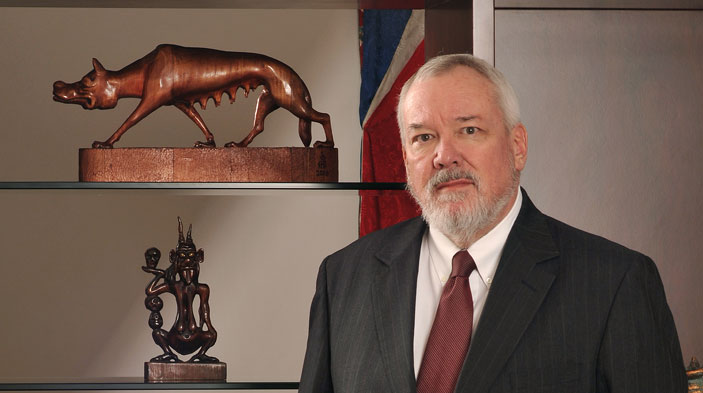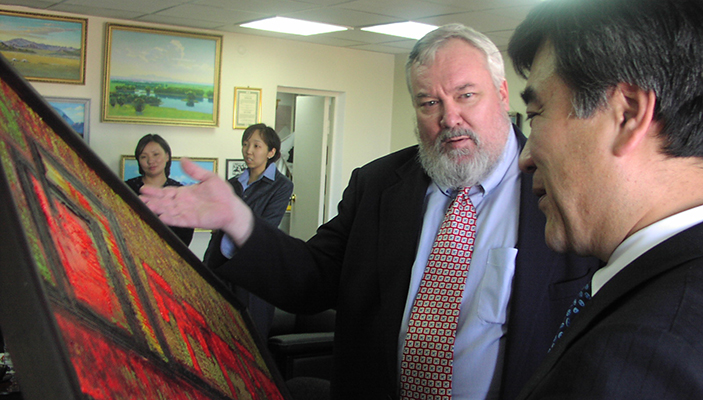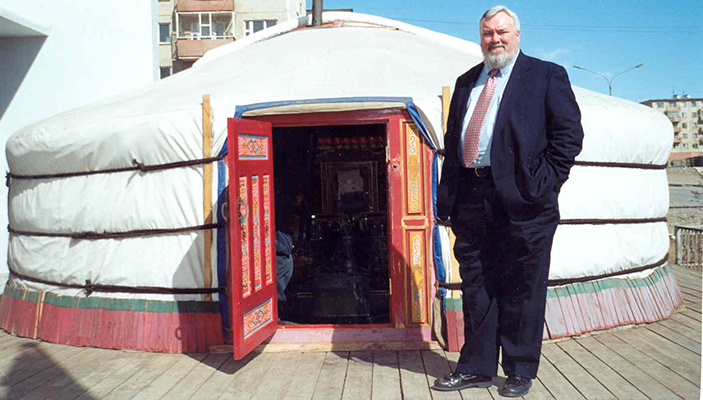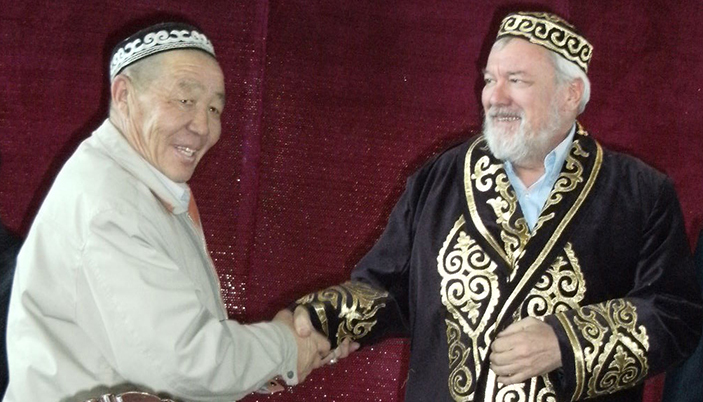DAI Mourns the Passing of J. Peter Morrow
March 08, 2016
DAI is deeply saddened to mark the passing of J. Peter Morrow, who led the dramatic turnaround of the Agricultural Bank of Mongolia (rebranded as Khan Bank) under a DAI project and went on to become one of Mongolia’s most respected business leaders and most honored foreign citizens. Morrow, who worked for DAI from 2000 to 2010, died on August 4 in Seattle. He was 68 years old.
Morrow, an American banker, began working in Mongolia when he was hired by DAI to prepare the state-owned “Ag Bank” for privatization. Given the Bank’s importance to Mongolian rural populations, the government agreed to put the institution under an external management team hired by DAI and funded by the U.S. Agency for International Development (USAID).
Morrow, pictured below, was hired as CEO and to the great surprise of most observers, instead of downsizing, Morrow began expanding the bank, offering herder-friendly loans and other consumer-oriented products, providing a safe place for deposits, and even opening new branches.

According to DAI CEO Jim Boomgard, hiring Pete Morrow to lead the restructuring was the key to DAI’s success. In 2011, the newly retired Morrow wrote an article for DAI’s Developments newsletter in which he described the keys to the turnaround: “We always understood the bank’s greatest asset was its reach. It was clear to me that turning the bank around required us to leverage, rather than cut back, the bank’s 269 branches … and launch new financial strategies that met the true demands of the 400,000 people who were using our locations.”
“Pete was a cornerstone of the transformation of the young Mongolian banking sector, a trustworthy partner, and mentor for a young generation of bankers. He was quickly recognized by locals as ‘our’ CEO. Pete was more than a banker—he was an honest advocate for the Mongolian government and civil society alike. We will miss him.” – Bold Magvan, CEO of XacBank and former Deputy Governor of the Bank of Mongolia (Central Bank).
“Pete saw the potential, simplified the bank’s operations enormously, and within one year the bank was operating profitably,” remembers fellow DAI colleague Bill Bikales, who led the DAI Mongolia team at the time. “Pete Morrow was exactly who we needed: a banker who had turned banks around.”
Morrow undertook the rejuvenation of Ag Bank with gusto, Bikales recalled. “Pete visited every branch. He was a big guy, and we were a little concerned whether he could squeeze into the old Russian-made jeeps to visit these rural, out-of-the-way areas, but he did. He was smart and fearless and confident in his instincts, and he fell in love with the place.”

By the end of his first two years, the Bank was a sustainable enterprise, and the Mongolian government decided to proceed with privatization. Attracting several favorable bids, the Bank was sold to a Japanese company, which asked Morrow to remain as CEO, under a DAI management contract. When the IFC invested in the Bank in 2006, DAI also became a small shareholder.
Under Morrow’s leadership, the bank, now renamed Khan Bank, went from strength to strength. By 2007, it had become one of Mongolia’s largest banks and was the national standard bearer for modern banking practices, customer services, and high international standards and transparency.
“[Morrow’s] contribution and influence in improving the lives of hundreds of thousands of Mongolians was priceless and truly generous. He was a pillar in the financial and business community.” – Business Council of Mongolia.
Morrow continued serving as CEO until 2010. Under his leadership, Khan Bank grew to more than 500 branches with 4,000 staff, serving more than 80 percent of the Mongolian population. When he retired from the Bank, it was the largest Mongolian bank in terms of number of branches, ATMs, clients, loans and deposits, and profits.
Rob Dressen, DAI’s senior banking and financial services advisor, remembers tough times as well as successes. “Without Pete’s perseverance, clear vision, decisive voice, and courage amidst the challenges, Khan Bank would not be what it is today.” Dressen continues to sit on Khan Bank’s Board of Directors, representing DAI until it sold its shares in 2012, and now serves as an independent director. “Pete’s legacy is a living one,” says Dressen. “We see it in the business the Bank does, the standards and values that have been inculcated, and the community service fostered by the Bank.”

Morrow was honored as Entrepreneur of the Year in 2001 by the Mongolian Chamber of Commerce, as Banker of the Year in 2002 by Mongolia’s Central Bank, and as Investment Envoy of the Year in 2003 by the Foreign Investment and Foreign Trade Agency. Khan Bank has been named Mongolia’s Bank of the Year several times by Banker Magazine of London and in 2011 was named one of the “Best Emerging Market Banks in Asia” by Global Finance magazine.
In 2005, the president of Mongolia presented Morrow with the Friendship Medal—the country’s highest award given to foreign citizens. In 2007, Morrow became only the third American to receive the Polar Star Medal for contributions to the country’s development. That year, Morrow became founding chairman of the Business Council of Mongolia, which released a statement upon Morrow’s death: “His contribution and influence in improving the lives of hundreds of thousands of Mongolians was priceless and truly generous. He was a pillar in the financial and business community.”

In December 2011, Morrow became founding chairman of the American University of Mongolia; DAI signed on as a corporate founder in 2013, and degree programs launched in 2014. Morrow was also a founding member of the Arts Council of Mongolia, and an active leader on the boards of leading companies and organizations. Most recently, he was a partner in NovaTerra, a financial advisory and project management firm in Ulaanbaatar.
Morrow graduated from Harvard University in 1969 with a bachelor’s degree in economics and studied law at Georgetown. Earlier in his career, he worked in senior management and leadership positions at the Export-Import Bank of the U.S. and a number of regional banks before embarking on short-term assignments to assist struggling banks in Romania, Kazakhstan, and Ukraine.
Morrow is survived by his wife, Pagma, and children Sara, Amy, and Charles.
RELATED CONTENT:
DAI Welcomes New Climate and Economic Growth Experts to U.K. Team
DAI is pleased to announce the addition of two new senior team members to our U.K. office: Kate Wilson Hargreaves, Director of Climate and Environment, and Joe Phillips, Head of Trade and Investment.
Read More